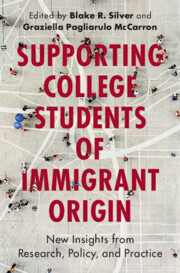Book contents
- Supporting College Students of Immigrant Origin
- Supporting College Students of Immigrant Origin
- Copyright page
- Dedication
- Contents
- Figures
- Tables
- Contributors
- Foreword
- Part I Beginnings
- Chapter 1 Understanding College Students of Immigrant Origin
- Chapter 2 The College Enrollment Process for Students of Immigrant Origin
- Chapter 3 Multilingual Adolescent Mentors and Tailored College Knowledge for Immigrant Students
- Chapter 4 The Role of Family Histories in Students of Immigrant Origin’s Aspirations and College Decision-making Process
- Chapter 5 Complicating College Readiness for Students of Immigrant Origin
- Part II Experiences
- Part III Institutional Arrangements
- Part IV Looking Forward
- Epilogue
- Index
- References
Chapter 1 - Understanding College Students of Immigrant Origin
from Part I - Beginnings
Published online by Cambridge University Press: 16 May 2024
- Supporting College Students of Immigrant Origin
- Supporting College Students of Immigrant Origin
- Copyright page
- Dedication
- Contents
- Figures
- Tables
- Contributors
- Foreword
- Part I Beginnings
- Chapter 1 Understanding College Students of Immigrant Origin
- Chapter 2 The College Enrollment Process for Students of Immigrant Origin
- Chapter 3 Multilingual Adolescent Mentors and Tailored College Knowledge for Immigrant Students
- Chapter 4 The Role of Family Histories in Students of Immigrant Origin’s Aspirations and College Decision-making Process
- Chapter 5 Complicating College Readiness for Students of Immigrant Origin
- Part II Experiences
- Part III Institutional Arrangements
- Part IV Looking Forward
- Epilogue
- Index
- References
Summary
This chapter – offered by the co-editors – situates the need for “Supporting College Students of Immigrant Origin: New Insights from Research, Policy, and Practice” in both historical and contemporary social, political, and cultural contexts. It also offers a blueprint for how a range of higher education stakeholders can engage with the volume and its individual chapters, which are organized into four distinct parts that chronologically trace students of immigrant origin’s journeys as they relate to higher education.
Keywords
- Type
- Chapter
- Information
- Supporting College Students of Immigrant OriginNew Insights from Research, Policy, and Practice, pp. 3 - 16Publisher: Cambridge University PressPrint publication year: 2024



